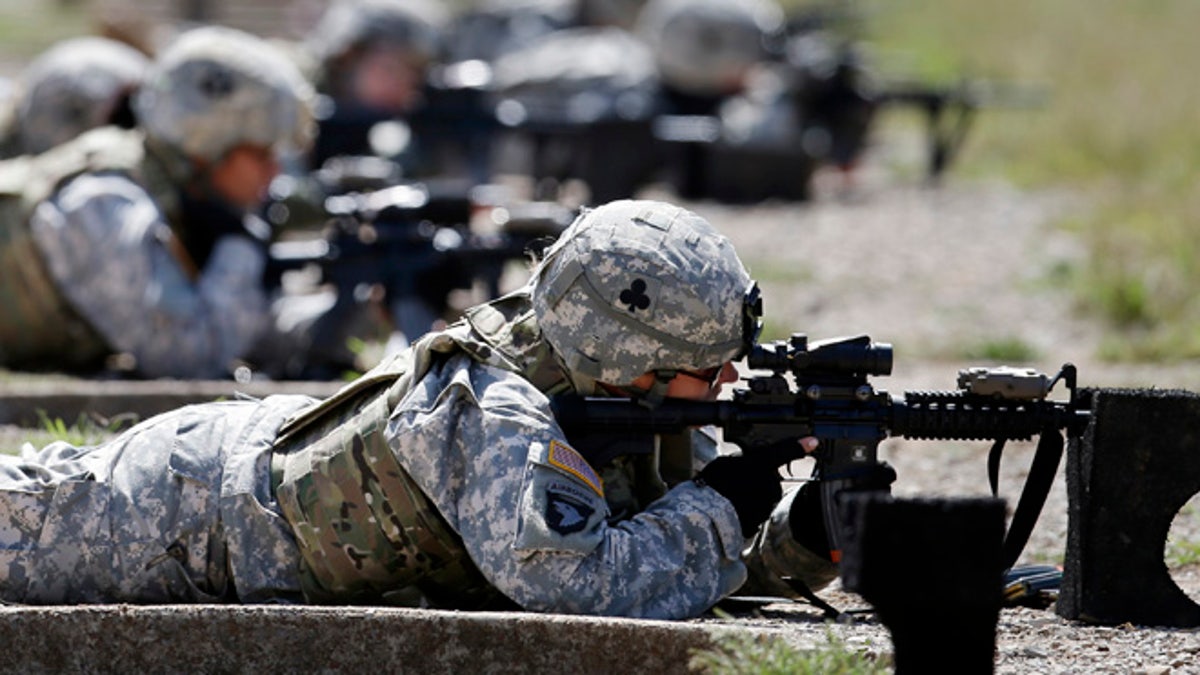
FILE - In this Sept. 18, 2012 file photo, female soldiers from 1st Brigade Combat Team, 101st Airborne Division train on a firing range while testing new body armor in Fort Campbell, Ky., in preparation for their deployment to Afghanistan. (AP)
Women have been in plenty of gunfights. For more than a decade now, they’ve been banging it out on the battlefield. I know there are women out there with the strength, agility, stamina and utter mental toughness to get through BUD/S, the SEALs’ legendary basic-training program with its grueling Hell Week and 75-percent wash-out rate for the men who try.
If you doubt me, check out the female leaderboard at next month’s CrossFit Games—or that young woman who’s been quietly knocking out weighted pull-ups at your neighborhood gym. Being physically fit is women’s work too.
This comes up, of course, now that Defense Secretary Leon Panetta has announced an official end to the ban on women in combat. The various parts of the U.S. military, including elite tactical units like the Navy SEALs, have been asked to weigh in on this long-expected change. After 14 years as a SEAL officer, the past four running all phases of basic and advanced SEAL training, I have to say, “I’m not sold yet.”
[pullquote]
The reason has almost nothing to do with the old concern that “a woman wouldn’t be able to pull an injured teammate off a battlefield.” I’m a big guy, 230 pounds without my body armor. In full commando gear, I’m 280 or 290. If I get shot, it’s the rare SEAL who can throw me over his shoulder like a bag of coal. If it takes two or three of them, that’s who will drag me out to safety. This is not an individual sport we’re playing here, even though SEALs are the battlefield Olympians. We live and die as a team.
- Infantry skeptical about women in combat units, Marine commandant says
- Military leaders lift ban on women in combat roles
- Decision to allow women in combat roles raises questions about draft
- First woman to lead in combat ‘thrilled’ with military’s policy change
- Do you agree with decision to lift ban on women in combat?
There’s a much bigger reason to be skeptical about female SEALs than any concern that women won’t carry their load. It goes to the very heart of what makes SEALs SEALs. From Somali pirates to Usama bin Laden, on countless raids and assaults in Iraq and Afghanistan, a huge part of our effectiveness comes from this organization we’ve been building. Brotherhood isn’t just a slogan to us. We are bonded together in a culture that is—let’s not sugar-coat this—fundamentally male.
I like to say the SEALs are the greatest man club on earth. The loyalty and drive that flow from that are key to almost everything we’ve achieved. It’s just a fact. Our unit cohesion is forged from testosterone, and look at what that’s produced: The most lethal, aggressive and effective assault teams on the modern battlefield, fighting their hearts out for America.
This isn’t always pretty, but it is something to behold: A bunch of charged-up, gregarious guys suiting up for battle, preparing mentally and physically for the violent mission ahead. Will all this come together in a coed locker room?
I and most of the SEALs I know deeply respect the women in our lives. As responsible men, we don’t want to behave like savages around our wives, mothers and female friends. So how are we supposed to act around our female teammates? Who I am at home is not who I am with my SEAL team. We can transition between the two. But gentlemen don’t make good killers, and killing is what we do.
Maybe there are alternatives worth considering. Women are already integrated into our units as intel pros, interpreters and mission planners. That could be expanded. Or maybe we should experiment with all-female platoons. Let’s send them onto the battlefield and see how they perform.
It really does come down to mission success. These highly effective teams didn’t get that way by accident. Their whole DNA shouldn’t be thoughtlessly rearranged.
We’re a military organization. In the end, if our leaders say, “Do it,” we’ll do it the very best we can. But I hope the change won’t be jammed down our throats before we honestly face the implications—on our training, our culture and our extraordinary record of success.
As I write in my new book, "Damn Few: Making the Modern SEAL Warrior": “Pound for pound, man for man, our success is hard to argue with. We keep proving ourselves over and over again. We are the most resourceful problem solvers on the modern battlefield, ideal warriors for the kinds of wars America is fighting now.”
Pound for pound, man for man—a warrior band of brothers.
